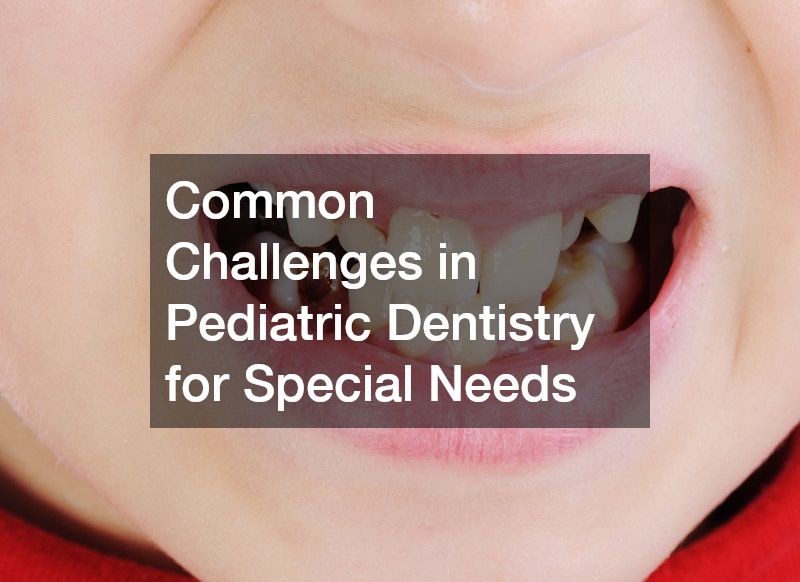The Importance of Pediatric Dentistry for Special Needs Care
Ensuring a child’s oral health is a fundamental part of overall well-being, but for children with unique needs, dental care can present specific challenges. Pediatric dentistry for special needs focuses on providing compassionate, tailored care to children who may face developmental, physical, or sensory challenges. These children require a dental approach that not only addresses their oral health needs but also considers their comfort and safety.
What is Pediatric Dentistry for Special Needs Care?
Understanding Pediatric Dentistry
Pediatric dentistry is a specialized branch of dentistry dedicated to the care of children, from infancy through adolescence.
Defining Special Needs Dental Care
Special needs dental care is tailored to children who may have physical disabilities, developmental disorders, or medical complexities. The focus is on modifying treatment approaches, communication techniques, and the clinic environment to meet each child’s unique needs.
The Role of Pediatric Dentists
Pediatric dentists trained in special needs care act as both caregivers and advocates. They understand how to approach patients who may be anxious, have sensory sensitivities, or struggle with communication.
Importance of Early Intervention
Early dental intervention is critical. Introducing children to a specialized pediatric dentist at a young age can prevent more severe dental issues later in life.
Advantages of Specialized Care
Specialized pediatric dentistry ensures that children receive care designed for their specific needs, minimizing stress for both the patient and the family.
Why is Pediatric Dentistry Crucial for Children with Special Needs?
Preventive Measures
Preventive care is the cornerstone of pediatric dentistry for special needs. Regular check-ups, cleanings, and personalized guidance on oral hygiene practices help prevent cavities, gum disease, and other oral health issues that can impact overall well-being.
Managing Oral Health Challenges
Children with special needs may face increased risk of dental issues due to medications, limited mobility, or difficulty maintaining proper oral hygiene. Pediatric dentists are equipped to handle these challenges with customized care and monitoring.
Building a Comforting Environment
Creating a welcoming, supportive environment is essential. Clinics designed with sensory considerations, such as reduced noise, soft lighting, or calming visuals, help children feel secure, making appointments less stressful.
Reducing Dental Anxiety
Anxiety is common in pediatric dental visits, and it can be more pronounced in children with special needs. Dentists use techniques like visual aids, clear communication, and gradual desensitization to reduce fear and build trust.
How Can Parents Find Qualified Pediatric Dentists for Special Needs Care?
Researching Dentists with Specialized Training
Parents should look for dentists who have completed additional training in special needs dentistry or pediatric care that focuses on children with unique requirements.
Evaluating Clinic Accessibility
The clinic environment matters. Accessible entrances, adaptive dental chairs, and staff trained in handling special needs patients can significantly enhance the experience.
Checking Dentist’s Experience and Credentials
Reviewing a dentist’s credentials, years of experience, and involvement in professional organizations can help ensure a high standard of care.
Seeking Recommendations and Reviews
Consulting other parents, caregivers, or local support groups can provide insight into trusted providers. Online reviews and testimonials can also guide decisions.
Understanding Coverage and Costs
Insurance coverage may vary for specialized pediatric dentistry services. Parents should confirm what procedures are covered and discuss costs upfront to plan effectively.
What Are Common Challenges in Pediatric Dentistry for Special Needs?
Communication Barriers
Some children may struggle to express discomfort or follow instructions. Dentists employ visual aids, simplified language, or sign language to overcome these barriers.
Sensory Sensitivities
Many children with special needs have heightened sensitivity to touch, sound, or smell. Adapting the environment and using gentle techniques can make procedures more tolerable.
Behavioral Management
Behavioral challenges can complicate treatment. Techniques such as positive reinforcement, scheduled breaks, and clear explanations help children cooperate and feel safe.
Providing Sedation or Anesthesia
For certain procedures, sedation or anesthesia may be necessary. Pediatric dentists are trained to administer these safely, ensuring comfort without compromising care.
Customizing Treatment Approaches
Individualized strategies, from shorter appointments to specialized tools, help accommodate each child’s needs and make dental visits productive and stress-free.
How Can Pediatric Dentists Improve Outcomes for Special Needs Children?
Collaboration with Multi-disciplinary Teams
Working alongside pediatricians, occupational therapists, and other specialists ensures that dental care aligns with overall medical and developmental needs.
Using Advanced Technologies and Tools
Innovative dental tools, such as digital imaging and adaptive instruments, make treatments more precise and less invasive.
Offering Continuous Educative Support
Ongoing education for parents and caregivers about oral hygiene, diet, and home care strategies enhances treatment outcomes.
Focusing on Preventive Care Practices
Emphasizing preventative measures reduces the risk of dental issues and minimizes the need for invasive procedures.
Implementing Patient-Centric Approaches
Tailoring care to each child’s preferences, comfort level, and sensory needs ensures a positive dental experience and long-term adherence to oral health routines.
Pediatric dentistry for special needs is a vital component of comprehensive healthcare for children with unique challenges. Specialized care addresses oral health concerns, reduces anxiety, and fosters lifelong healthy habits.







